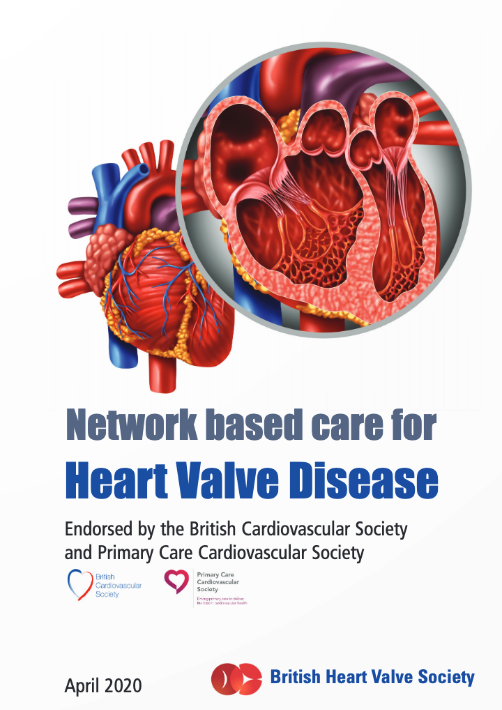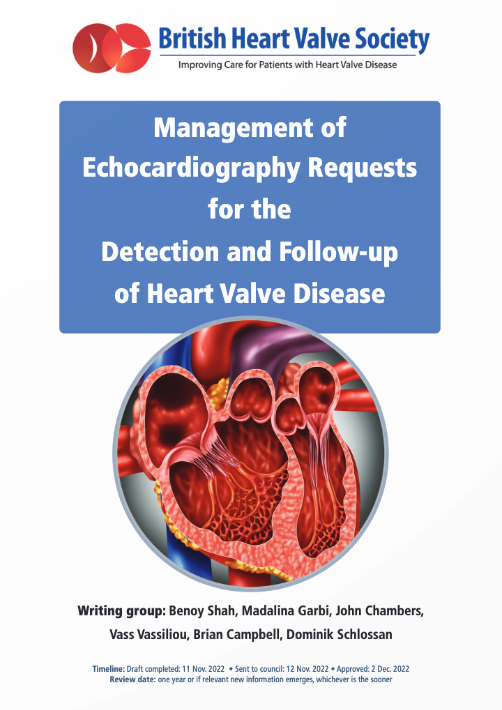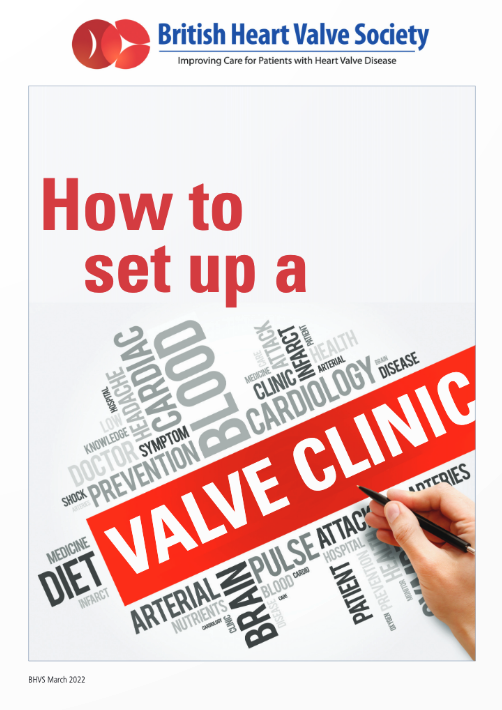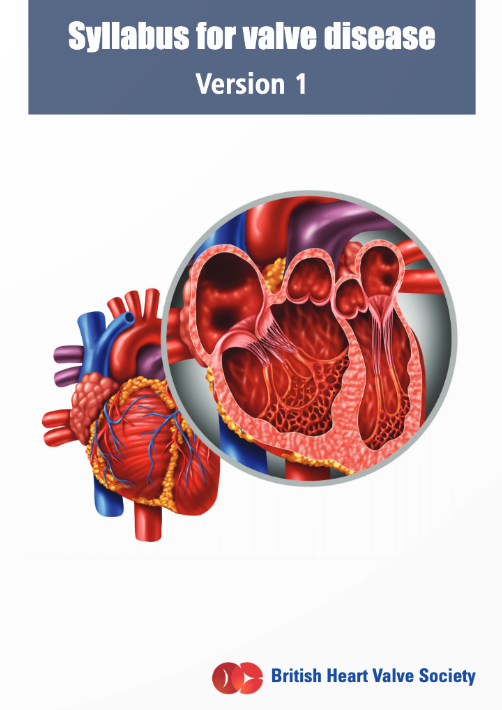
Guidelines in heart valve disease management
There are many guidelines available regarding heart valve disease management. These are designed for clinicians but may be helpful for you to read. Small details are different according to the guidelines but all offer structured advice to ensure that patients get guideline-directed therapy. Links to the main guidelines can be seen below:
2021 ESC Guidelines
2021 NICE Guidelines
2020 AHA/ACC Guidelines
COVID-19
Authors Shah BN, Schlosshan D, McConkey HZR et al.
Title Outpatient management of heart valve disease following the COVID-19 pandemic: implications for current and future care.
Journal Heart 2020; 106(20):1549-1554

Blueprint
The British Heart Valve Society has produced the BHVS Blueprint, a consensus document on service delivery which has been endorsed by the British Cardiovascular Society and the Primary Care Cardiovascular Society.

Management of echocardiography requests
Management of Echocardiography Requests for the Detection and Follow-up of Heart Valve Disease

How to set up a valve clinic
This guide is to help and support healthcare professionals who are interested in setting up a valve clinic. The guide describes 10 steps in establishing a valve clinic (Box 1). These recommendations are based on the personal experience of the authors that have been involved in setting up valve clinics in their own hospitals.

Syllabus for Valve Disease
This BHVS document describes the nationally agreed core syllabus for Valve Disease and will contribute to the definition of subspecialism in valve disease.

Statements
Statements issued by the BHVS, sometimes as a Joint Statement with other professional medical societies, in response to important issues concerning patients with heart valve disease.

Frequently asked questions in heart valve disease
My doctor says I have a murmur. What is this?
A murmur is simply the noise made by blood passing through the heart and is often normal. The pulmonary artery is relatively close to the skin and blood flow may be audible through a stethoscope particularly if you are slim. This is called a ‘benign systolic flow murmur’. About 20 in 100 of all adults aged 18 and over have a murmur. Only about 2 in 100 have valve disease. This benign murmur may also be accentuated if the action of the heart is increased, for example because you are anxious, have just run up-stairs or are anaemic or pregnant. Usually a benign flow murmur can be differentiated from an abnormal murmur, but if there is doubt then an echocardiogram may be necessary.
The echocardiogram report describes mild leakage from some of the valves. Should I be concerned?
Normal heart valves often have slightly irregular edges and it can be normal for these to leak slightly. Mild leakage is usual from the tricuspid and pulmonary valves and may also be normal through the mitral valve.
As we age, minor thickening of the valves develops, particularly in the aortic valve. A small degree of leakage of the aortic valve is common especially after about 65 years of age. If there is more than mild leakage you will need to discuss with your doctor whether this is of no consequence or whether further follow-up could be necessary.
Is valve disease infectious?
Disease may sound like an infection but it is a term used for any significant change from normal. Valve disease means that the valve has developed abnormal thickening or become damaged.
It is possible but rare for a leaking or thickened valve to become infected. This is called infective endocarditis.
You cannot pass valve disease onto another person even if it has a rheumatic origin or if you have infective endocarditis.
Is valve disease hereditary?
Valve disease is common so relatives might have valve disease by coincidence. However, relatives of people with a bicuspid aortic valve have about a 1 in 10 chance of also having a bicuspid valve. It may be worth considering an echocardiogram to check for this. Some types of mitral prolapse may run in families but this is unusual.
Is valve disease dangerous?
Provided it is treated appropriately with surgery when this is indicated the results are excellent. Valve disease may be dangerous if unrecognised and if symptoms are allowed to progress without treatment. If you have unexplained breathlessness or chest pain or dizziness on exertion you should visit your usual doctor to see whether further tests may be necessary.
I have chronic valve disease. Is this bad?
‘Chronic’ as used medically simply means long-standing. It does not mean severe. The term for disease of recent onset is ‘acute’. These distinctions are useful medically because they have different causes. For example, acute severe aortic regurgitation is almost always caused by endocarditis; chronic moderate or severe regurgitation is more likely to be caused by a congenitally abnormal aortic valve. More importantly the body has usually already adapted to chronic valve disease while acute disease is more likely to need urgent surgery.
Is valve disease a problem when I have non-cardiac surgery?
This depends on what surgery you are having, what type of valve disease and whether you have symptoms from the valve disease. Every case is different.
Low risk non-cardiac surgery (e.g. cataract extraction, cosmetic surgery) is safe whatever the valve disease. Aortic or mitral regurgitation is usually safe for any types of non-cardiac surgery provided there are no symptoms from the valve disease and the LV is normal.
Aortic stenosis and mitral stenosis may be a problem in high-risk non-cardiac surgery (e.g. aneurysm repair, lung resection) and a specialist opinion is needed. Hip surgery is classed as intermediate risk
Am I safe to have a magnetic resonance scan?
Yes. The strong magnet can move iron-containing objects but replacement valves do not contain iron.
What about X-rays and CT scans
Again no problem
Will I set off the alarms at airport security?
No because the valve contains no iron and also is small.
How long will my heart valve last?
This is a bit like the ‘how long is a piece of string’ question. Mechanical valves do not fail and are expected to outlive the youngest patient if no complication like infection develops. How long biological valves last depends on the design, the position, the age when you have it and, to a degree other factors like high blood pressure and diabetes. Some valves like the Edwards Perimount or the Medtronic Hancock II have excellent longevity in the aortic position in people aged over 60, sometimes lasting 20 years. Any biological valve implanted in someone aged under 50 has limited durability especially in the mitral or tricuspid position and may fail within 5 years, sometimes less.
Even though I had mitral valve repair at the optimal time there is still some leakage. Will this cause damage to the left ventricle over time and would this mean more surgery?
It is not uncommon to be left with a small residual leak and this is not of concern. Remember mild or moderate regurgitation does not need surgery and even severe regurgitation only needs surgery when symptoms or LV size thresholds are reached. If there is more severe residual regurgitation, which is unusual, then you will need follow-up just as for unoperated mitral regurgitation. Redo surgery is occasionally necessary, either with a different type of repair or a replacement.
If I need re-do surgery will the surgeons re-open the same scars? Is that safe and will it take twice as long to heal as the first time?
This is hard to answer because there are too many ‘ifs and buts’. The options are to reopen the chest with a cut just next to the previous one, use a different surgical approach or plan a ‘key-hole’ procedure to avoid opening the chest. The risks of redo surgery depend on many factors like age and other diseases and can be higher than the first operation. In a younger fit person the risks may not be appreciably higher. The wound should not take longer to heal unless you have developed diabetes which can affect healing rates.
I’m over 80 and grateful for the extra good years that heart surgery has given me but I’ve decided not to have any further interventions or surgery and to accept the outcome. With no living relatives to discuss this with, how can I be sure my wishes will be upheld?
In an outpatient clinic your doctors should always take account of your views and should never try to over-ride these. Our training and all the guidance we receive and discuss as we update our knowledge at refresher courses makes the point that there are general guidelines but these have to be adapted to each individual. In the event of a collapse so that you were unable to communicate you might want to consider a living will and you should talk to a solicitor about this.
Can I travel?
Flying is not a problem with a normally functioning repaired or replaced valve. A good rule of thumb is that if your heart is capable of letting you climb up the stairs into the plane it will not be bothered by the depressurisation during the flight.
A pacemaker but not the valve itself may set off alarms in the airport; you will need to inform the security officers.
You will obviously need to declare the replacement valve to your insurance company.
Anticoagulation control could be a nuisance for an extended trip and could be a reason to get a self-testing kit.
